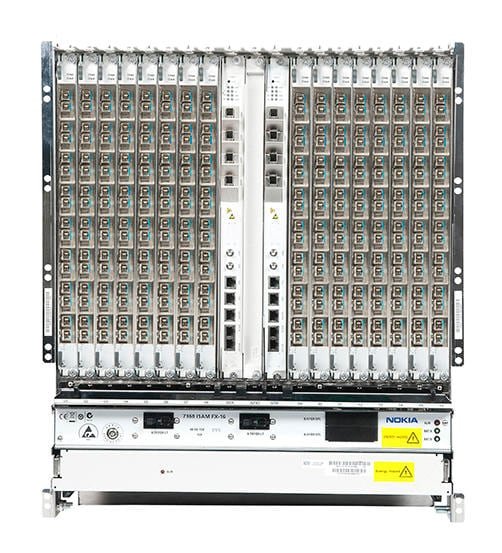GPON & Beyond
The logical alternative is to install a fiber-based network that can handle speeds well beyond a gigabit. Nokia Optical LAN is a fiber-based solution that meets the needs of the modern-day business while providing a cost-effective evolution as speeds continue to increase. Nokia Optical LAN delivers significantly better performance than a traditional copper-based LAN, enabling network convergence, simpler operations, greater speeds per user, and up to 50% savings in operating costs.
7360 Intelligent Services Access Manager (ISAM) FX OLT
Features
Support GPON technology
Different shelf sizes, 4, 8 or 16 line cards
Each GPON card can have 8 or 16 ports
Each port can connect up to 64 connection points
Managed by POL Control Center (PCC)
Benefits
Capable of serving from 2000 (FX-4), 6000 (FX-8) end-points from a single location
Peak bursts up to 1 GB/s per user/device with Dynamic Bandwidth Allocation (DBA)
Power efficient green technology
Converges all applications (voice, data, video, wireless backhaul, surveillance) onto a single platform
Benefit of Gigabit Passive Optical Networks (GPON)
Robust Security
Unlike copper, Optical LAN cables is not affected by electromagnetic interference
Advanced encryption with two-way key exchange
Pro-active monitoring to ensure high availability (link protection, logical layer protection, controller and line card redundancy)
Lower Operating Costs
Optical LAN power savings can be greater than 50%
Smaller footprint relative to multiple distributed copper-based Ethernet switches, bring space cost savings of 60%
Optical LAN has significantly fewer active components, resulting in maintenance cost savings of over 50%
Optical LAN reduces fault management costs by up to 50%
Scalability
Run up to 30km without needing any boosters or repeaters
Allows any type of deployment (ceiling, wall, desk mounted), provides Gigabit Ethernet interfaces in single or multi-port configurations and supports different powering options
Capacity can be easily upgraded in the future using the same cabling



